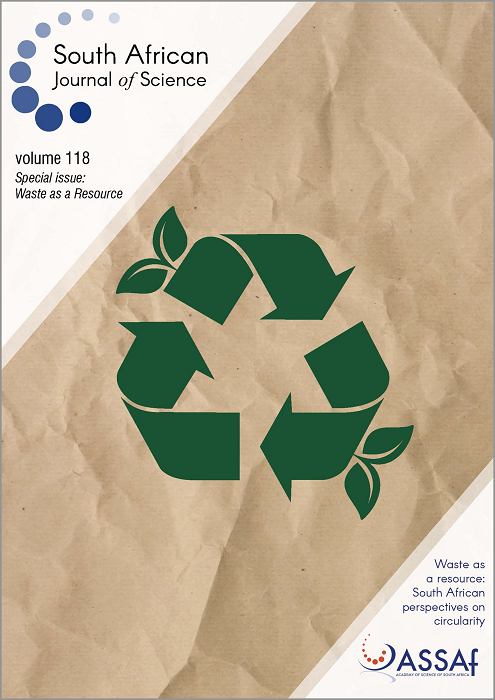Circular closed-loop waste biorefineries: Organic waste as an innovative feedstock for the production of bioplastic in South Africa
DOI:
https://doi.org/10.17159/sajs.2022/12683Keywords:
bioplastic, organic waste, climate change, landfill, waste biorefineryAbstract
The impact of landfills on the environment has come under increasing scrutiny in recent years due to the confounding effects of climate change and water scarcity. There is an urgent need to reduce from landfills the greenhouse gas emissions that cause climate change, and to provide effective treatment solutions for waste, thereby diverting it from landfills. With an estimated 80 million tonnes of plastic waste entering the world’s oceans annually, the accumulation of marine plastic has become a global crisis. Plastic pollution threatens food safety and quality, human health and coastal tourism, and contributes to climate change. For these reasons, there is an urgent need to explore a bioplastic biorefinery process. This review paper examines the potential of organic waste as an alternative carbon source in the efficient and feasible microbial production of polyhydroxyalkanoate (PHA) and polyhydroxybutyrate (PHB), which are precursors for bioplastic. More specifically, this paper presents a concept for a bioplastic biorefinery from a technological perspective, based on data from previous studies. Biofuel production processes are also assessed with the aim of integrating these processes to construct a bioplastic waste biorefinery. Garden refuse and food waste have been shown to be feasible feedstocks for the production of PHA and PHB in singular processes. Diverting these wastes away from landfills will significantly ease the environmental impacts currently associated with their disposal.
Significance:
- A bioplastic biorefinery is a viable alternative to treat municipal organic waste.
- Several biofuel production processes can be integrated into a bioplastic biorefinery system.
- Organic waste is poorly managed in South Africa, resulting in greenhouse gas emissions.
- Several barriers and considerations must be overcome before implementing the technology at full scale.
Published
Issue
Section
License

All articles are published under a Creative Commons Attribution 4.0 International Licence
Copyright is retained by the authors. Readers are welcome to reproduce, share and adapt the content without permission provided the source is attributed.
Disclaimer: The publisher and editors accept no responsibility for statements made by the authors
How to Cite
- Abstract 638
- PDF 931
- EPUB 306
- XML 262
Funding data
-
National Research Foundation
Grant numbers 128149;115447












.png)